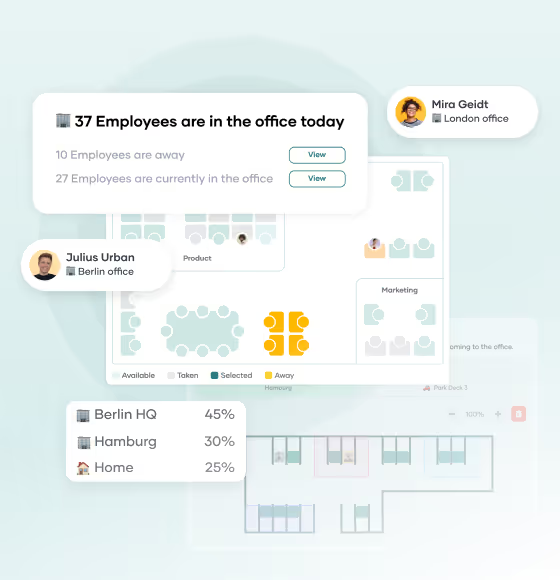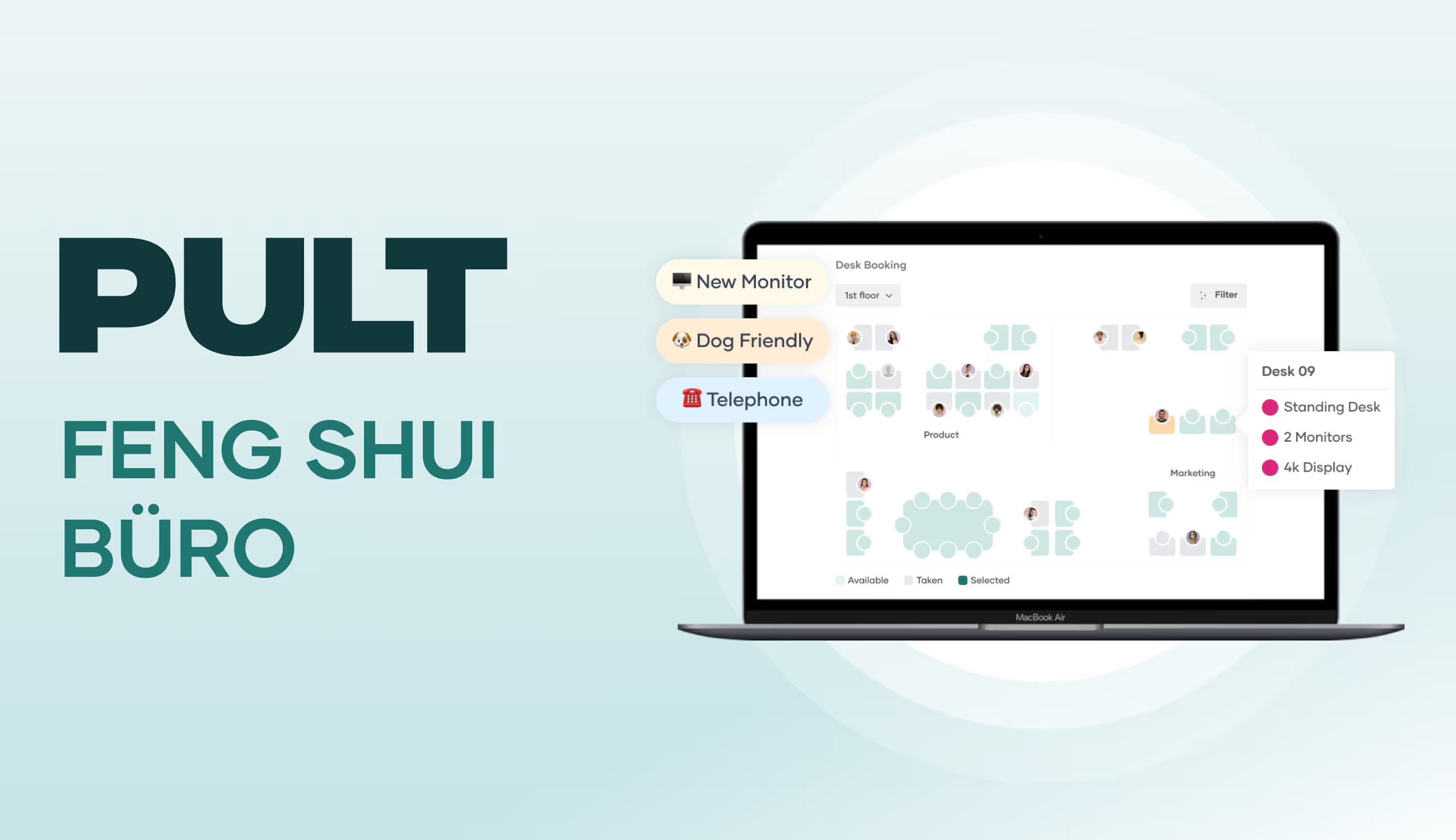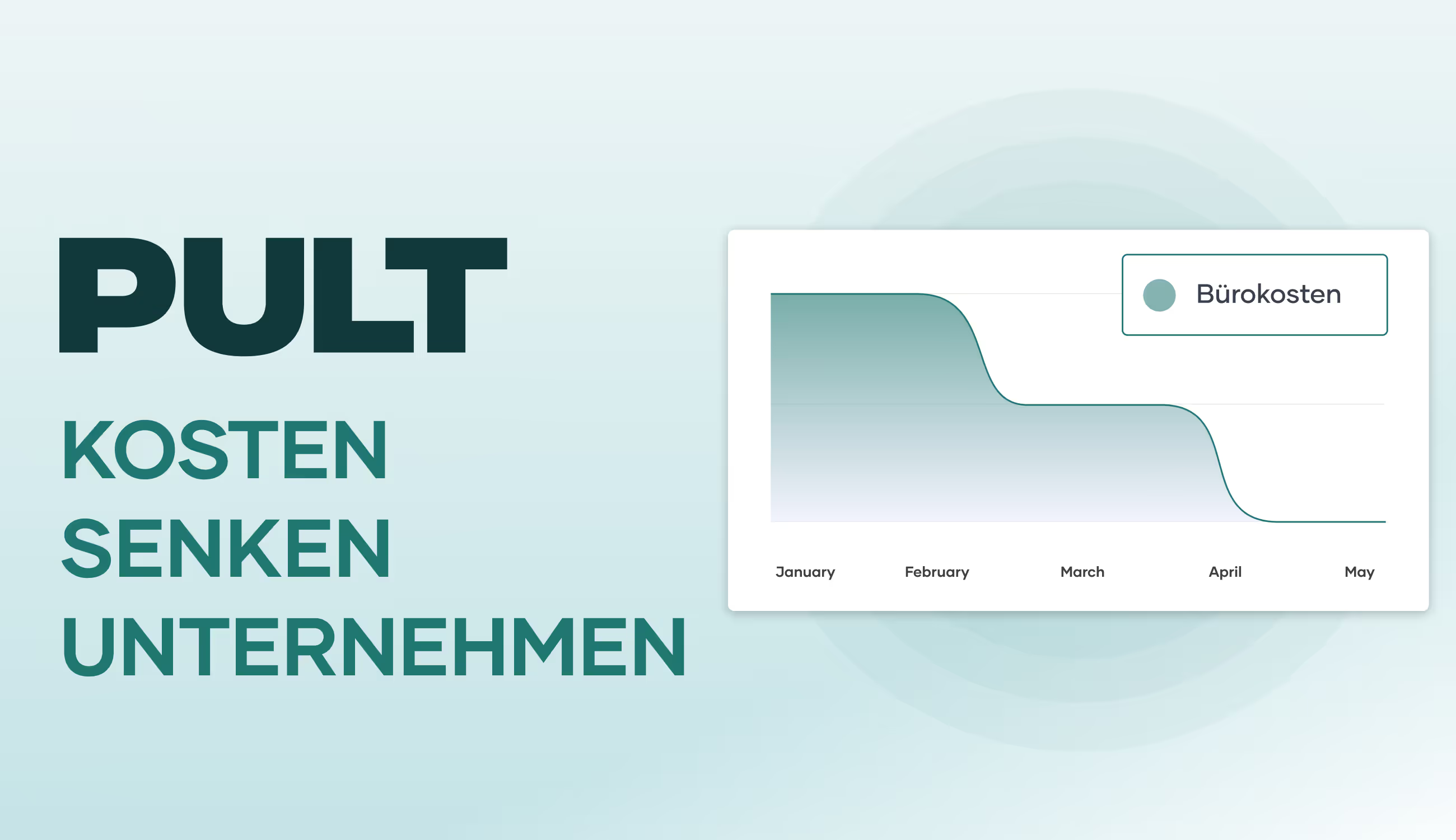Employment law and desk sharing | For employers

Desk sharing in employment law
The most important information about desk sharing in employment law at a glance:
- Desk sharing is permissible under labour law, but not unconditionally. The use of a workplace by several people is permitted as long as occupational health and safety, data protection and co-determination rights are upheld.
- Co-determination by the works council: The works council must be involved in the introduction and use of booking systems, clean desk policies and workplace allocation in accordance with Section 87 (1) of the Works Constitution Act (BetrVG).
- Occupational health and safety applies without restriction, even in the case of changing workstations. Every shared workstation must be ergonomically designed, hygienically maintained and individually adjustable. A risk assessment is mandatory.
- Only necessary data may be processed by desk booking systems. It is not permissible to draw conclusions about the behaviour of individual employees.
{{hint-box}}
Is desk sharing permitted under labour law?
Yes, desk sharing is generally permitted. Employers may determine how work is organised within the scope of their managerial authority (Section 106 of the Trade Regulation Act). This also includes the design of workstations.
However, this right to issue instructions is limited where occupational health and safety law, data protection or the co-determination rights of the works council come into play.
It is important that desk sharing does not entail any unreasonable disadvantages for employees:
- Workplaces must be equipped to the same standard.
- Availability must be guaranteed.
- Personal rights such as the protection of health or privacy must not be impaired.
Purely economic reasons, such as saving office space, are not sufficient to implement measures that violate other protective rights. The admissibility under labour law therefore always depends on the specific design and accompanying regulations.
Works council's right of co-determination in desk sharing
The introduction of desk sharing is subject to co-determination in accordance with Section 87 (1) BetrVG. Relevant co-determination issues include, in particular:
No. 1: Organisation of the workplace and conduct of employees
If desk sharing regulates behaviour in the workplace, for example through a clean desk policy, fixed booking rules or zone concepts, the works council must be involved.
No. 6: Technical monitoring equipment
If a digital booking system is used that allows conclusions to be drawn about the behaviour, attendance or performance of employees, this is only permissible in compliance with the GDPR and is also subject to co-determination in accordance with Section 87 (1) No. 6 BetrVG.
Depending on the design, Section 90 BetrVG (rights to information) may also apply if the change in the workplaces constitutes a redesign of the working environment. This applies in particular if structural changes, furnishing or room concepts are affected.
Case law recognises that desk-sharing models with a structural or disciplinary effect (e.g. clean desk, reduced number of permanent workstations, visitor control via booking systems) are subject to co-determination.
In a recent case, the Baden-Württemberg Regional Labour Court (2024) ruled that even the design of free workplace choice with supplementary rules of use may not be determined unilaterally by the employer. (File number 21 TaBV 7/24)
Data protection in desk sharing
The use of booking systems, access controls or presence sensors in connection with desk sharing generates personal data. This includes information on working hours, attendance, workplace use or booking history. This data is subject to the provisions of the General Data Protection Regulation (GDPR) and may only be processed if there is a legal basis for doing so.
As a rule, data processing is based on Art. 6(1)(f) GDPR (legitimate interest of the employer), for example for the purpose of organising workplace occupancy.
The principle of data minimisation applies here: only as much information may be collected as is necessary for the purpose. Blanket collection of movement or behaviour data is not permitted.
In addition, the employer is obliged to inform employees transparently about the purpose, scope and storage period of data processing in accordance with Art. 13 GDPR. If there is a works council, it must be involved in the selection and introduction of appropriate systems in accordance with Section 87(1)(6) BetrVG.
{{hint-box-2}}
Occupational safety in desk sharing
The same occupational health and safety requirements apply to shared workstations as to designated individual workstations. The relevant basis for this is the Workplace Ordinance (ArbStättV).
Employers are obliged to set up workplaces in such a way that the safety and health of employees is guaranteed, regardless of whether a workplace is used permanently or alternately.
The requirements are derived from:
- § 3a ArbStättV: Design of the workplace in accordance with ergonomic principles
- § 4 ArbStättV: Regular cleaning and hygienic conditions
- Workplace Regulation ASR A1.2, which formulates requirements for space requirements and furniture, among other things.
Every booked workplace must be ergonomically adjustable (e.g. height-adjustable chair, correctly positionable screen), provide adequate lighting and be cleaned regularly, especially if there are frequent changes of users. In any case, the equipment must meet the requirements of the respective job profile.
In addition, a risk assessment in accordance with Section 5 of the ArbSchG is also required for desk sharing. The risks associated with changing workplaces, such as a lack of adjustment options or unclear responsibilities for maintenance and cleaning, must be taken into account and documented.
Typical challenges of labour law in desk sharing
Desk sharing brings organisational changes and potential conflicts in everyday working life. You can avoid these by considering the technical, legal and cultural framework conditions from the outset.
1. Overbooking and lack of workspaces
If the number of available workstations does not reliably match actual demand, dissatisfaction will arise. You can prevent this with a booking system that shows utilisation rates, allowing you to plan capacity based on real demand.
Tip: You can get a complete overview of utilisation and peak times in PULT's Office Insights.
2. Lack of planning security for employees
Your employees need to be able to rely on their journey to work not being in vain because there is no space available. A binding regulation on booking and use, for example in a works agreement or team guideline, creates certainty here. Then let your team make binding bookings for their preferred workspaces in the PULT desk booking software.
3. Personal belongings and storage
In an office with a clean desk policy, the question arises as to where personal materials such as keyboards, documents or private items can be stored. Lockers, personal rolling containers and personal IT equipment (e.g. laptops with docking stations, headsets) are practical and proven solutions.
4. Lack of quiet areas
Stress levels increase when all work has to be done in a shared open-plan office. With desk sharing, it is important to ensure that employees have access to quiet areas for concentrated work and confidential conversations and phone calls.
When is desk sharing compatible with occupational health and safety?
Whether desk sharing is permissible under labour law depends largely on whether occupational health and safety requirements can be met. The Workplace Ordinance (§ 3a, § 4 ArbStättV) requires, among other things, ergonomic workplaces, regular cleaning, adequate lighting and individually adjustable equipment. These standards must also be met when usage changes.
For you, this means:
Desk sharing only makes sense and is legally viable where workplaces are standardised, fully equipped and can be used without risk, regardless of who uses them.
When are desk sharing and occupational health and safety compatible?
- If the work is predominantly digital, location-independent and physically undemanding, ergonomic standards can be ensured by providing equivalent, standard-compliant equipment at all workstations.
- If all workstations have identical screens, input devices and ergonomic chairs, changing users can work without any health risks. Provided that individual adjustments (e.g. table height, screen distance) are possible.
- If quiet individual workstations, meeting rooms and retreat areas are planned and provided, psychological stress caused by sensory overload or constant reorientation can also be reduced.
When are desk sharing and occupational health and safety incompatible?
- Desk sharing is not well suited for employees with orthopaedic chairs, special screen readers or other adapted technology. They require permanently furnished workstations. These requirements are difficult to reconcile with changing workstations without violating § 3a ArbStättV or § 5 ArbSchG.
- Those who work exclusively in open desk-sharing zones without access to quiet rooms or retreat areas are exposed to increased psychological stress. This may violate the employer's duty of care.
- Workspaces that are used by different people every day must be cleaned and technically inspected on a regular basis. If there are no clear processes in place for this, there is an increased risk of hygiene and safety deficiencies.
Desk sharing can therefore only be operated safely where all occupational health and safety requirements can be monitored and met on a sustainable basis. The decision for or against a desk sharing model should therefore always be part of the risk assessment and not be based solely on space efficiency or cost reasons.
Conclusion: Reconciling desk sharing and labour law in your company
Desk sharing changes the requirements for planning, management and legal diligence with regard to workplaces. If you allocate workplaces in your company on a rotating basis, you are directly interfering with the organisation of work and must comply with the provisions of labour law.
Legal risks do not arise from desk sharing itself, but from implementation without a clear structure. Ergonomically inadequate equipment, a lack of private spaces and unclear booking rules lead to violations of occupational health and safety, co-determination and data protection, often unintentionally.
With PULT, you can lay the foundation for organising desk sharing in a legally compliant and team-friendly manner.
- Workstation booking according to ergonomic criteria using the filter function (height-adjustable desks, multiple monitors, etc.)
- Zone planning with retreat options
- Automated documentation of utilisation, for example for risk assessments or works agreements.
- No conclusions about the work and booking behaviour of individual employees
Office Insights show you how the office is actually used and thus help you with planning.
{{cta}}
Desk sharing in labour law – frequently asked questions and answers
Is a risk assessment also necessary for desk sharing in the office?
Yes, desk sharing represents an organisational change and must be included in the risk assessment in accordance with Section 5 of the ArbSchG (German Occupational Safety and Health Act). Particular attention must be paid to ergonomic, hygienic and psychological stress factors.
Do desk sharing workstations have to be cleaned daily?
Yes, daily cleaning is required under labour law when workstations are shared. This is based on Section 4 of the ArbStättV (Workplace Ordinance) in conjunction with the Occupational Safety and Health Act, especially in cases of frequent occupancy or use by different people.
Can a works council completely prevent desk sharing?
No, there is no right of veto. However, the works council has co-determination rights with regard to the design (§ 87 (1) BetrVG), in particular with regard to booking rules, technical systems or clean desk policies.
Can an employer record who booked which space and when?
Only if this is necessary for the organisation of the business and the purpose is clearly defined. Processing must be limited to what is necessary (data minimisation according to Art. 5 GDPR).
Does desk sharing have to be regulated separately for people with disabilities?
Yes, according to Section 164 (4) SGB IX, employers must design working conditions in such a way that they are suitable for people with disabilities. Flat-rate desk sharing models may contradict this. Individual solutions are required for the employees affected.
A new hybrid workplace experience is coming. Start Now. 🎉
A new hybrid workplace experience is coming. Start Now. 🎉





















.avif)





